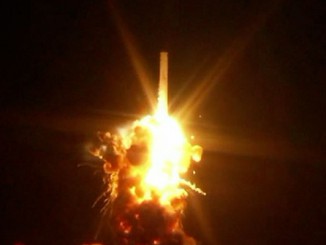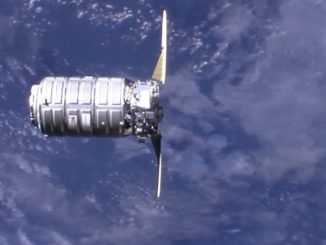
Orbital Sciences Corp. has selected a new first stage propulsion system for its Antares rocket, the head of the company said last week, offering improved performance for launches beginning in 2017.
But David Thompson, Orbital’s chairman and CEO, revealed few details of the selection, saying the information will be withheld until the company completes upcoming bids for several competitive launch procurements, including a potential follow-on contract with NASA to resupply the International Space Station.
Orbital’s Antares rocket, which is now powered by Russian-built AJ26 engines modified in the United States, is one of two launchers NASA uses to send up cargo to the space station. SpaceX’s Falcon 9 booster is the other launch vehicle.
After running into technical difficulties due to the old age of the AJ26 engines — they were manufactured in the 1970s — and concerns over the sustainability of the supply chain for new engines, Orbital looked at other options for its Antares first stage once its existing NASA resupply contract is up at the end of 2016.
“The company had set an objective of making a decision on our future main stage propulsion approach by early fall, which we have done,” Thompson said Thursday in a conference call with investors. “I think we’re very pleased with our decision. It’s going to position Antares to be very competitive in the future — to have a little higher level of payload performance — which will be helpful in a variety of applications.”
Thompson told investment analysts not to expect any “material blip” in Orbital’s research and development spending to pay for the redesign of the Antares rocket to accomodate the future engine.
“The cost to make the necessary modifications are in line with our prior estimates, and those will be incurred over a couple of year period and will fit comfortably within normal levels of R&D and capex (capital expenditures) for the company,” Thompson said.
Industry officials said Orbital was eyeing a switch to a solid-fueled first stage for the Antares rocket. Orbital expects to close a merger with ATK, a solid rocket motor supplier, by early next year, Thompson said.
ATK already builds the Antares rocket’s Castor 30 upper stage and provides rocket motors to Orbital’s other launch vehicles.
The Dulles, Va.-based company was also looking at engines from two Russian suppliers — the Kuznetsov Design Bureau, which originally built the AJ26 engine currently flying on Antares, and NPO Energomash, the manufacturer of the RD-180 engine used by the United Launch Alliance Atlas 5 rocket.
Aerojet Rocketdyne imported 43 Kuznetsov-built NK-33 engines from Russia in the 1990s to integrate on U.S. rockets. The first American launch contractor to fly the engines was Orbital Sciences, which bought 20 engines for 10 missions, consisting of two test launches and the eight cargo deliveries to the space station.
Aerojet Rocketdyne converted the 20 NK-33 engines into the AJ26 configuration by adding U.S. electronics, qualifying the engines for U.S. propellants, putting in equipment to permit the engines to gimbal for steering, and adding electromechanical valve actuators, according to officials familiar with the engine’s modernization.
The AJ26 engines consume liquid oxygen and rocket-grade kerosene propellants. Each engine generates more than 350,000 pounds of thrust at sea level.
Orbital plans to launch the fifth flight of an Antares rocket from a launch facility at Wallops Island, Va., as soon as Oct. 27.
The Antares launcher carries Orbital’s Cygnus supply ship into orbit to rendezvous with the space station and deliver food, provisions, experiments and critical items to maintain the international research complex.
Orbital is on schedule to complete work under its eight-mission, $1.9 billion resupply contract with NASA by the end of 2016.
NASA is negotiating with Orbital Sciences and SpaceX to extend their cargo transportation contracts for about a year, with each company standing to receive payments for additional missions in 2017 beyond their existing slate of launches.
The space agency intends to conduct a full and open competition for cargo missions in 2018 and beyond.
According to Thompson, the Antares rocket’s new first stage will be ready by 2017, and Orbital has access to enough AJ26 engines ensure a smooth switch to the new engine if it encounters delays.
“We have an adequate supply of our current engine to overlap for six months or longer in the event there were any delays in the new system,” Thompson said.
Besides submitting a proposal for the new NASA cargo transportation contract, for which bids are due Nov. 14 and winners are to be selected next spring, Orbital expects the Antares rocket to compete for deals to launch government and commercial satellites.
The next Commercial Resupply Services contract with NASA will cover logistics missions from 2018 through 2024, the date that the Obama administration has committed to supporting the space station.
Orbital officials said the company has seen improving profit margins over the course of its current NASA resupply contract, thanks to streamlined operations and reduced recurring costs.
“Our target will be to achieve superior profit margins on that new contract from the outset,” Thompson said. “Exactly what those numbers are and so on, I won’t comment on, but they should definitely be stronger than the first contract.”



